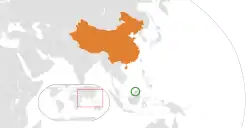 | |
Brunei |
China |
|---|---|
| Diplomatic mission | |
| Embassy | Embassy |
| Envoy | |
| Ambassador Abdu'r Rahmani | Ambassador Xiao Jianguo |
Brunei and China established formal diplomatic relations in 1991. Brunei has an embassy in Beijing, and China has an embassy in Bandar Seri Begawan.[1]
History
_Nanjing.JPG.webp)
Direct contact between China and Brunei began as early as the 10th century. The claim is evidenced by the archaeological findings of Chinese artefacts at Kampong Limau Manis, Brunei Darussalam. With more than 50,000 ceramic shards dating between the 10th-14th centuries-old having been collected from the Limau Manis site,[2] the discovery proves the indisputable fact that China-Brunei relations have existed for a long time.
In modern times relations are not close since Brunei was a British protectorate, beginning in the 19th century until it gained official independence on 1 January 1984.[3] During this time, there were also various concerns in Brunei particularly toward communism and its sensitivities to the ethnic Chinese population.[3] On 30 September 1991, Brunei became the last member of ASEAN to establish official diplomatic relations with China.[1]
In 2019, Chinese leader and CCP general secretary Xi Jinping visited Brunei. An opinion letter published by the national newspaper, Borneo Bulletin, hailed it as an "exceptional moment" in Brunei–China relations.[4] Finally, China's relations with Brunei would serve to help the country economically. The establishment of Hengyi Petrochemical Complex, the setting up of StarCity Brunei, and other investments into the economy would help to diversify the rentier state further. However, China's growing influence is seen with suspicion by other external powers, such as the US,[5] but Brunei is confident that it sees China as a strong and dependable economic ally and vice versa.
Economic relations
In 2011, trade between the two countries has increased to U$1.3 billion.[3] The two countries promote practical co-operation in some areas such as infrastructure construction, agriculture and fishery.[6] Some Chinese companies also have agreed to finance two projects in aquaculture and paddy production in Brunei which worth about U$10 million.[7]
The Brunei-Guangxi Economic Corridor was established in 2014, into which approximately US$500 million has been promised.[8] China is the largest foreign investor in Brunei, with investments estimated at US$4.1 billion.[8]
The Chinese Ambassador to Brunei, Yang Hian, described Brunei as an important part of the Belt and Road Initiative.[8] China and Brunei operate Brunei's largest port, Muara Container Terminal, as a joint venture between China's Guangxi Beibu Gulf Port Group and Darussalam Assets Sdn Bhd.[8]
According to Chatham House fellow Bill Hayton, China is pressuring Brunei to allow it more access to Brunei's exclusive economic zone.[8]
See also
Further reading
References
- 1 2 "Brunei-China Relations". Ministry of Foreign Affairs and Trade (Brunei). Archived from the original on 22 February 2014. Retrieved 17 February 2014.
- ↑ "Brunei Gallery - SOAS: The Islamic Sultanate of Brunei: Past and Present Culture".
- 1 2 3 Prashanth Parameswaran (9 November 2012). "China, Brunei: ties that bind". Asia Times Online. Archived from the original on 9 November 2012. Retrieved 17 February 2014.
{{cite web}}: CS1 maint: unfit URL (link) - ↑ https://borneobulletin.com.bn/president-xi-jinpings-visit-an-exceptional-moment-in-brunei-china-relations/
- ↑ "Brunei Between Big Powers: Managing US-China Rivalry in Asia".
- ↑ Zhu Ningzhu (11 October 2013). "China, Brunei agree to further boost strategic cooperation". Xinhua News Agency. Xinhua.net. Archived from the original on 16 October 2013. Retrieved 17 February 2014.
- ↑ "China Firms in B$10m Brunei Rice-Growing and Aquaculture Projects". The Brunei Times. Embassy of China in Brunei. 12 November 2009. Retrieved 17 February 2014.
- 1 2 3 4 5 Bowie, Nile (18 March 2018). "China throws sinking Brunei a lifeline". Asia Times Online.
